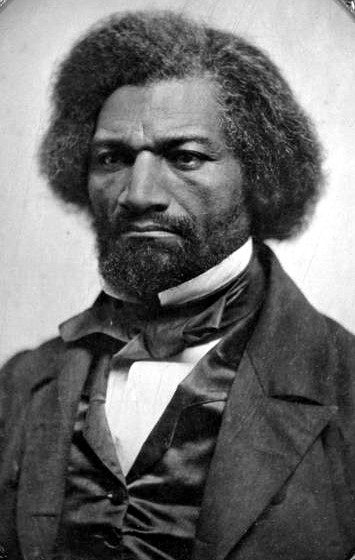Post by Admin on Aug 28, 2019 14:26:31 GMT -4

Douglass Unbroken at Mt. Misery
By Georgetowner
America’s great orator, abolitionist and social reformer, Frederick Douglass, was born a slave in Talbot Country in 1818. Never really knowing his mother, he left his owner’s farm to work for a young student in Baltimore. From a master’s wife, he learned the alphabet but was quickly forbidden to read. Nevertheless, he learned by asking anyone nearby what the words on a sign said. Later, Douglass was transferred to another owner and sent to Mount Misery (where the Rumsfeld and Cheney families have houses) in St. Michaels to be whipped repeatedly and was almost broken. He challenged the slave-breaker to a personal fight — fisticuffs — and won. He escaped to freedom in 1838 and grew to be one of the most influential Americans of the 19th century. He died in Washington, D.C., in 1895. His home in Anacostia is maintained by the National Park Service as a historic site.

Frederick Douglass (born Frederick Augustus Washington Bailey; c. February 1818 – February 20, 1895 was an American social reformer, abolitionist, orator, writer, and statesman. After escaping from slavery in Maryland, he became a national leader of the abolitionist movement in Massachusetts and New York, gaining note for his oratory and incisive antislavery writings. In his time, he was described by abolitionists as a living counter-example to slaveholders' arguments that slaves lacked the intellectual capacity to function as independent American citizens. Northerners at the time found it hard to believe that such a great orator had once been a slave.
Douglass wrote several autobiographies. He described his experiences as a slave in his 1845 autobiography, Narrative of the Life of Frederick Douglass, an American Slave, which became a bestseller, and was influential in promoting the cause of abolition, as was his second book, My Bondage and My Freedom (1855). After the Civil War, Douglass remained an active campaigner against slavery and wrote his last autobiography, Life and Times of Frederick Douglass. First published in 1881 and revised in 1892, three years before his death, it covered events during and after the Civil War. Douglass also actively supported women's suffrage, and held several public offices. Without his approval, Douglass became the first African American nominated for Vice President of the United States as the running mate and Vice Presidential nominee of Victoria Woodhull, on the Equal Rights Party ticket.
Douglass was a firm believer in the equality of all peoples, whether black, female, Native American, or Chinese immigrants. He was also a believer in dialogue and in making alliances across racial and ideological divides, and in the liberal values of the U.S. Constitution. When radical abolitionists, under the motto "No Union with Slaveholders", criticized Douglass' willingness to engage in dialogue with slave owners, he replied: "I would unite with anybody to do right and with nobody to do wrong."

Life as a slave
Frederick Augustus Washington Bailey was born into slavery on the Eastern Shore of the Chesapeake Bay in Talbot County, Maryland. The plantation was between Hillsboro and Cordova; his birthplace was likely his grandmother's cabin east of Tappers Corner, (38.8845°N 75.958°W) and west of Tuckahoe Creek. The exact date of his birth is unknown, and he later chose to celebrate his birthday on February 14. In his first autobiography, Douglass stated: "I have no accurate knowledge of my age, never having seen any authentic record containing it."
Douglass was of mixed race, which likely included Native American and African on his mother's side, as well as European. His father was "almost certainly white," as shown by historian David W. Blight in his 2018 biography of Douglass. He said his mother Harriet Bailey gave him his grand name. After escaping to the North years later, he took the surname Douglass, having already dropped his two middle names.
He later wrote of his earliest times with his mother:
The opinion was ... whispered that my master was my father; but of the correctness of this opinion I know nothing ... My mother and I were separated when I was but an infant ... It [was] common custom, in the part of Maryland from which I ran away, to part children from their mothers at a very early age. ... I do not recollect ever seeing my mother by the light of day. ... She would lie down with me, and get me to sleep, but long before I waked she was gone.

